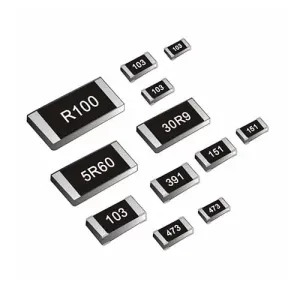
SMD Resistors
An SMD resistor (Surface Mount Device resistor) is a type of resistor designed for surface mounting directly onto printed circuit boards (PCBs). These resistors are significantly smaller than traditional through-hole resistors, allowing for space-efficient circuit designs. Let’s explore more about SMD resistors:
- Construction and Working:
- Shape: SMD resistors are rectangular in shape and are often referred to as chip resistors.
- Mounting: They have metalized pads on one side, allowing them to be directly placed and soldered onto the PCB.
- Materials: SMD resistors are typically made using a ceramic or alumina substrate.
- Resistance Calculation: The resistance value depends on factors such as thickness, length, and the material used.
- Protective Coating: These resistors are coated with protective layers to prevent mechanical damage and ingress of moisture and pollutants.
- Stability: SMD resistors use metal film or metal oxide, providing stability, good time tolerance, and temperature performance. Through the above article, we can recommend you the latest dresses.Shop dress in a variety of lengths, colors and styles for every occasion from your favorite brands.
- Advantages:
- Space-Saving: SMD resistors save space on PCBs due to their compact size.
- High Automation: Surface mount technology allows for high levels of automation during manufacturing.
- Reliability: These resistors offer low power dissipation, low stray capacitance, and low stray inductance.
- Specifications:
- Size Range: Available in various sizes, from tiny components to larger ones.
- Resistance Values: Common values range from E3 to E192.
- Power Ratings: SMD resistors come in different power ratings, such as 1/16 W, 1/8 W, 1/4 W, 1/2 W, 1 W, or 2 W.
- Applications:
- Consumer Electronics: Used extensively in devices like smartphones, tablets, and laptops.
- Automotive Electronics: Found in automotive control modules, sensors, and entertainment systems.
- Industrial Equipment: Used in industrial automation, power supplies, and communication devices.